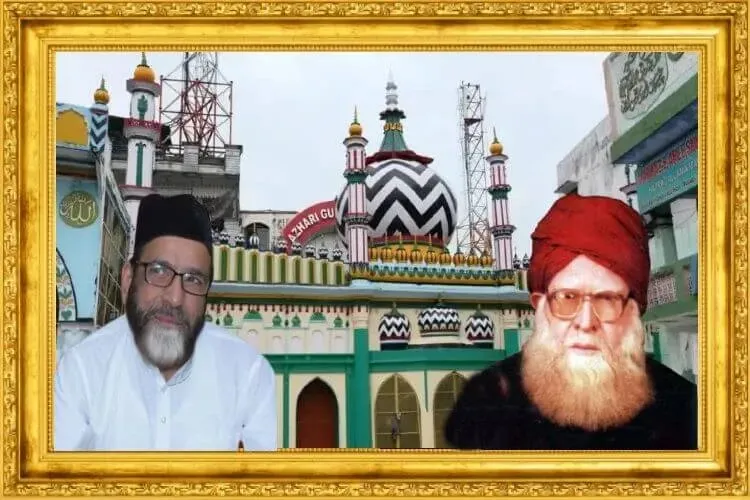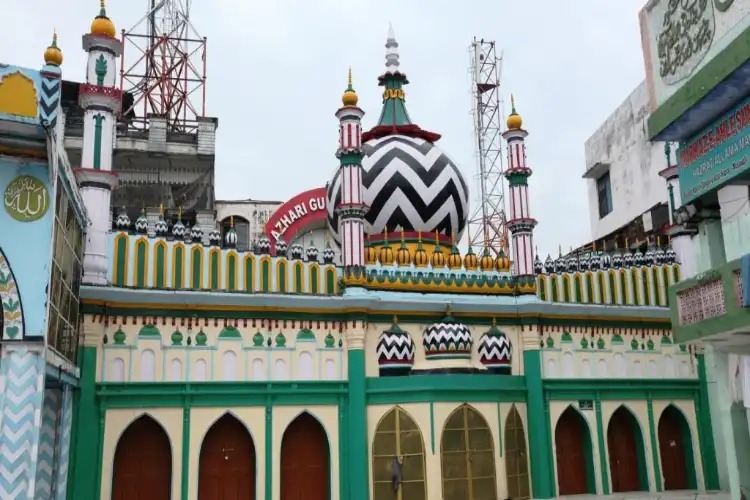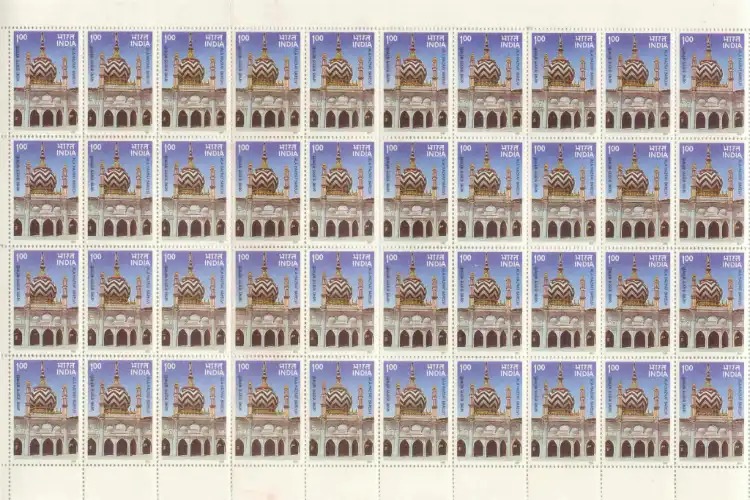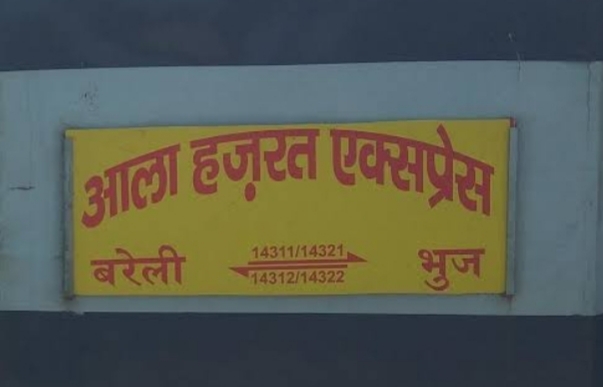
Ghaus Siwani
The Dargah of Bareilly is one of the most visited shrines in the Indian subcontinent. It attracts visitors from all over the world. The dargah is identified as a hub for Muslims who follow the Barelvi school of thought that is generally linked with Sufi traditions.
Recently, on the occasion of the 103rd Urs or the death anniversary of Maulana Ahmad Raza Khan Barelvi, the founder of the Barelvi sect who is called Aala Hazrat, by his followers, Congress leader Rahul Gandhi recalled the historic relations between the family of Maulana Ahmad Raza Khan Barelvi, and the Nehru-Gandhi family and also the Congress party. He offered a chador for the shrine at Bareilly while hoping the bond will continue, His allusion was to the support of the family to his Congress in Uttar Pradesh Assembly Elections.
Khandaan
In the current UP elections, Maulana Tauqeer Raza Khan, a descendant of Dargah-e-Ala Hazrat, has announced his support to the Congress party. The family continues to wield influence and power that was once only due to the patriarch Maulana Raza Khan, a man of letters and spirituality.
While most of his descendants have taken to religion, some like Taqueer Raza Khan have jumped into politics. However, nothing has changed the reverence and respect of the followers of Maulana Raza Khan for his creed and family. Aala Hazrat Maulana Ahmad Raza Khan’s two sons Mufti Hamid Raza Khan and Grand Mufti of India Mustafa Raza Khan have continued to be respected and followed by people.
Mufti Akhtar Raza Khan Azhari of the same family was recently declared as one among the 500 most influential Muslims in the world, as he had millions of followers.
 Dargah Aali Hazrat in which are the graves of Aala Hazrat and his sons
Dargah Aali Hazrat in which are the graves of Aala Hazrat and his sons
Maulana Ahmad Raza Khan Barelvi was a well-known religious scholar and is also called Aala Hazrat and was given the title of ‘Imam’. He was an insightful religious scholar, jurist, philosopher, logician, mystic, poet, and mathematician. He wrote a large number of fatwa and these have been compiled and published as a book. He also translated the Quran into various languages and it’s available as Kanzul Iman.
Aala Hazrat had a deep interest in Sufism and revered the saints. He has extensively quoted the Sufi philosophy and literature in his fatwas and books. He belonged to the Qadriya chain of Sufis. At the age of 22, he became a disciple of Hazrat Shah Ale Rasool Marhravi. His mentor granted him the Khilafah permission of several Sufi sects. This means he was allowed to have his set of disciples and followers and set up his mutts. He gained followers from across the Indian subcontinent and the number kept adding through his descendants.
To honour the contribution of Maulana Ahmad Raza Khan Barelvi, to the spiritual growth of India and to commemorate his services, the Government launched the "Aala Hazrat Express" train and also released a commemorative stamp on 31 December 1995. The Hajj House in Ghaziabad, Uttar Pradesh, is also named after him and so is the Bareilly Airport’s main terminal; it’s called Aala Hazrat terminal.
Aala Hazrat belonged to the Barich tribe of the Pashtun-speaking Afghans. In the Mughal era when India’s boundaries had been extended to Afghanistan, the members of this family came first to Lahore and then moved to Delhi and thereafter to Bareilly.
The Pathans had risen in revolt against the British and stopped them from conquering their land.
The family held high positions in the Mughal era and they became distinguished scholars in the times to come. Aala Hazrat's father Maulana Naqi Ali Khan was a Pashtun while his mother Hussaini Khanum was a Mughal. His maternal grandfather was Nawab Asfandyar Beg of Lucknow.

Postal Stamp commemorating the Aala Hazrat Ala Hazrat Maulana Ahmad Raza Khan
Hazrat Maulana Ahmad Raza Barelvi had become famous for his scholarly works. There are a large number of the madrasa, mosques, and religious institutions that are based on this ideology. His followers follow saints, mystics, and other religious leaders who believe in Sufism. They believe in a direct relationship between a man and his creator. The followers of Aala Hazrat thus look to Bareilly for religious and spiritual guidance. The importance of this first family has not diminished even after a century; in fact, it has gone a few notches up.
The Barelvi movement has spread to Pakistan, India, Bangladesh, Nepal, Africa, Latin American countries as well as Europe and America. At the beginning of the movement, more people from villagers followed it. However, at present, it has made inroads into the urban, educated classes. Recently with terrorism and extremism rising all over the world, Muslims with an inclination to Sufi ideology are been seen as moderates and are generally called the Sufis.
Mufti Hamid Raza Khan, the eldest son of Aala Hazrat was anointed as the first Sajjada Nasheen of the Dargah.
A few religious madrasas are affiliated with the Dargah. These were established by Maulana Ahmad Raza Khan Barelvi and his family. The expansion of Madrasas is going on. Even today the dargah issues Fatwa and these are issued by a team of the eminent Muftis.
The fatwas issued from the dargah have shaken the government many a time. In the seventies, when there was a national emergency and fear of sterilization, fatwas were issued against sterilization. A fatwa against terrorism and Lashkar-e-toiba supremo Hafiz Saeed has also been issued from this place.
Maulana Ahmad Raza Khan carried forward the intellectual and spiritual heritage of his family. He was bestowed upon the title of Hujjat-ul-Islam. He was a follower of Aala Hazrat and was permitted caliphate from his father.
Mufti Mustafa Raza Khan Qadri was the youngest of the two sons of Aala Hazrat. He was well-known as the Grand Mufti of India. He taught for almost 30 years at Jamia Rizviyah Manzar Islam, Bareilly, an institution founded by his father. He wrote some books also. However, he attracted a large number of followers because of his Peri-Muridi practice that is akin to the Guru-shishya tradition of Indian thought.
He had millions of followers from India, Pakistan, Bangladesh, and other countries. The number of his disciples and caliphs was also very high. The Grand Mufti of India was born on July 7, 1893, in Mohalla Sodagaran, Bareilly. He died here on November 11, 1981.
Mufti Akhtar Raza Khan Azhari was one of the prominent descendants of Aala Hazrat’s family who carried forward his legacy. Jordan's Royal Islamic Society annually ranks the world's most influential Muslims placed him at the 22nd position in the list of the world's 500 most influential Muslims. In fact, he has millions of followers and devotees worldwide.

Signboard of the Aala Hazrat train
Mufti Akhtar Raza Khan was one of the leading scholars in the field of jurisprudence in India. He was also an eloquent speaker and millions of people come to listen to him. He was given the title of "Taj Sharia". Born in Bareilly on February 2, 1943, he passed away on July 20, 2018. His funeral was attended by thousands of people. The city of Bareilly had never seen such a procession as it happened in his funeral.
Mufti Akhtar Raza Khan Azhari's legacy is being carried forward by his 51-year-old son Mufti Asjad Raza Khan Barelvi. Are He is also in charge of the madrasa established by his father. He has also spoken out against terrorist and extremist ideologies.
Maulana Tahir-ul-Qadri addressing a gathering
Members of the noble family are generally seen as religious and spiritual authorities away from politics and at times they are also seen as politically inclined persons. For example, Maulana Tahir-ul-Qadri of the family has formed his semi-political organization Ittihad-e-Millat Council. This party had once participated in municipal elections and won 10 seats. The party's mayoral candidate also received 36,000 votes. In the 2009 general election, Maulana Taqeer Raza Khan has backed the Indian National Congress.
With this support, Congress candidate Parveen Singh Arun defeated Bharatiya Janata Party candidate and six-time MP Santosh Ganguly. In the 2012 Uttar Pradesh Assembly elections, he supported the Samajwadi Party, while in the 2014 general elections he sided with the Bahujan Samaj Party.
In May 2013, the Samajwadi Party appointed Maulana as Vice Chairman of Handloom Corporation. He also demanded that a committee be formed to probe into the causes of communal riots in the state under Chief Minister Akhilesh Yadav.
However, in September 2014, he resigned from his post following the Muzaffarnagar riots. He accused the Samajwadi Party-led government of failing to protect Muslim citizens. He also alleged that his demand for an inquiry into the sectarian riots had not been met.
